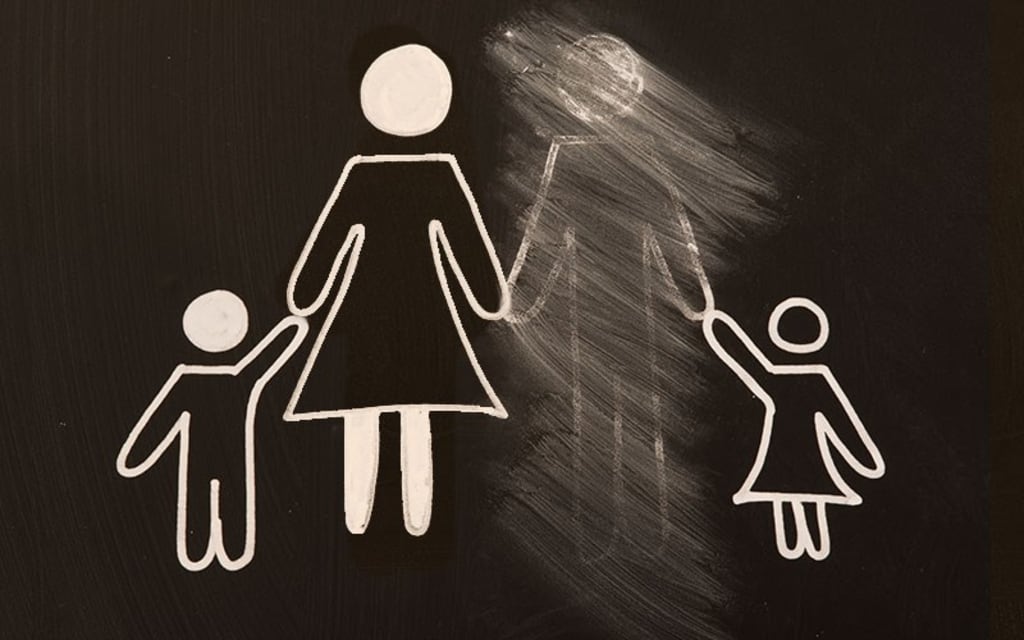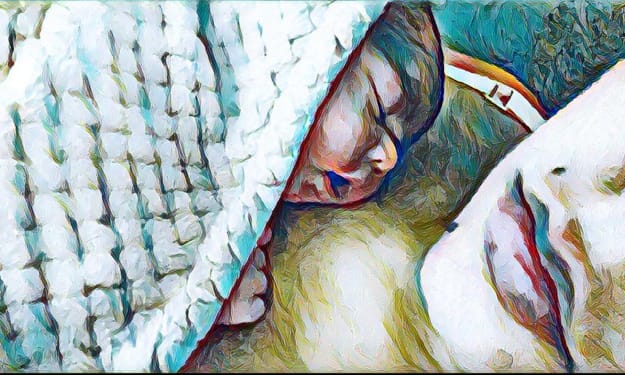No Chance to Know
Mourning the way things should have been

Sounds come back to me first. My ears ring. The muted voices of a not-so-distant conversation. An incessant beeping. The soft pumping of machinery. Then I feel pain like the drip-drip-drip of a leaky faucet. A dull throb in my head and at the base of neck. Pain resulting from an attempt to lift my left arm again, el dolor causing my weighted eyelids to flutter. Black spots in my vision as my eyes adjust to brightness. I blink hoping to disperse the lingering disorientation. Sterile walls and innocuous framed artwork. A hospital.
The realization steels my breath, as fragmented memories cut through my haze. The sight of the shards of glass refracting light in a kaleidoscope of colors, as a windshield shattered on impact. It all happened so quickly and yet the spray of glass seemed to be flying in slow motion, the last thing I saw before losing consciousness. The surge of emotions threatens to drown me, insistent machinery announcing my distress as a nondescript nurse rushes to my side, a flurry of commands and actions surrounding me. Fear grips my lungs so that I can’t breathe. The floodgates are open now, and I’m swept away in a current of grief.
---------------------
Sinking into my own bed for the first time in days, I feel cocooned in the comfort of the familiar. Mi mama insisted on staying with me for a few days while I adjust to fending for myself with a broken arm, my dominant arm at that. We compromised so that she’ll only stay tonight on the condition that I call and check in with her daily, and that I ask for help if I need it rather than soldiering on in my stubborn self-sufficiency.
“Lili?” My mom calls from down the hall. “Tienes hambre? I can make you a sandwich con pan Cubano?”
She says this last part like a question, seeking my approval knowing that I feel her hovering is unnecessary. But this is the way with Cuban mothers, they’ll nurture you to death…or at least to insanity. And yes, I’m aware of the irony of being nurtured to death.
For mami’s sake, I take her up on the offer. It’s obvious to me that she needs to feel useful right now and giving her something to do with her hands would keep her busy and benefit me with some time to myself.
Within moments, I hear her clanging about in la cocina rattling the utensils as she opens and closes drawers and cabinet doors.
Mustering my courage, I tear into the clear bag emblazoned with the hospital logo. The plastic crinkles as I rummage through my father’s personal effects found in the pockets of the clothing he wore on the day of the accident. The hospital released the items to me when I was discharged because, as his next-of-kin and the eldest, who else would come for it?
The simple watch face is cracked, and I toss it on the bed beside me. Next, I flip open the wallet to discover an old photo of my sister and me, three and six years old respectively. He kept a photo of us? It couldn’t have been taken more than a few months before he left us, my dimpled smile and long bangs and my sister’s dark blonde curls and brown eyes displaying the innocence and bliss of youth when our biggest disappointments were lost dolls or no ice cream for dinner. The photo taken before our biggest disappointment became his absence.
A knot forms in my throat and my eyes begin to blur and burn as I attempt to sniffle away the tears, refusing to cry. What right do I really have to cry or mourn? Surely not the rights of a true daughter. I hardly knew the man, after all, but that was supposed to start changing. Apparently, God had other plans.
Noticing a few small cash bills and a crinkled receipt, I flatten the paper and study the restaurant name and the itemized pastry and café Cubano. The transaction is dated and time-stamped two hours before the accident…his last meal. I wonder if the food tasted differently to him that day? Richer or bolder? Or, perhaps, blander? Musings I’ll never have answers to, of course.
I shove the crumpled paper back into the wallet which I toss next to the watch. Then, my hand meets the textured binding of a small book. I run a hand along the battered black cover, then riffle through the pages to discover most are scrawled with shaky chicken scratch.
Las paginas, the pages, appear worn with time, and the inside front cover reads, "Propiedad de Alonso Guerrera.” Property of Alonso Guerrera. I read the first page dated the day I was born…
Mija,
Hoy te conoci. Today I met you and I held you for the first time…
I startle both because I realize this first page and all of the pages following are addressed to me, and because my mom’s voice trails from down the hall as she calls for me to come eat. I slam the book shut more forcefully than I intended, afraid that she’ll start asking questions if she finds me in here with this book. Questions I really don’t even have the answers to yet, and I’m neither mentally nor emotionally prepared to face.
“Si mami, ya voy. I’m coming!” I say rushing from my room and closing the door on my way out.
---------------------
“The insurance company is going to pay out $20,000 to cover your medical expenses and they’ll send someone to appraise the car for damages, pero your father’s death is a different story and you will have to talk to a lawyer. Yo creo, I think, that they want to settle out of court so they’re quick to cover your medical bills.” Mami is speaking between bites in her familiar Spanglish.
I sit across from her picking at my food and losing track of her rambling. I should feel relieved that, at the very least, the insurance money will cover the hospital bills and then some, not by much but better than nothing at all. It sort of feels like $20,000 in exchange for his life and the questions I didn’t get to ask him. I feel cynical with the thought.
“…tu tia Maria knows a cousin of her daughter’s fiancé’s friend who is an accident attorney. Your prima said she’ll get the contact information so we can call and explain the details…”
Not for the first time, I feel the biggest surge of gratitude that, despite my objections, she’s handling the preparations and paperwork and never-ending phone calls. Mami to the rescue just like when I was a kid, and it was just the three of us girls, no “man of the house.” She was mother and father, nurturer and provider. On her own she brought us up after he left us behind and never looked back. At least, I assume he never looked back. The little black book in my room may shed some light otherwise.
“…your papa’s funeral is scheduled for this Saturday. It will be small, just some familia and a few amigos from Miami. We’ll have some very pretty flowers and you wi—”
I tune back in realizing this is yet another arrangement she’s taken care of, sheltering me from the stress. Cutting her off, I ask abruptly, “why would this life be so cruel to give him back to me only to take him away again on our first meeting in over 20 years?”
I don’t expect an answer and I can see she’s lost in thought and surprised by my question. She reaches across the table to put her hand on my hand giving me a light squeeze.
“Mi niña…” she trails off looking me directly in the eyes. What does she see there? Can she read where the question is coming from? “…tu papa had many demons, muchos demonios. Many of us do in this life.” She responds in some vague form of wisdom. Like a proverb. Or a fortune cookie.
“But what does that even mean, mami? Demons like what? You never talked about him; I don’t even know the man we’re burying. All I know is that I feel regret and guilt because I’m not mourning him, I’m mourning the fact that now I’ll never have a chance to know him if I wanted to. I’m mourning the lost time and how it was supposed to be.” I say as I start choking on my sobs, recognizing the truth in my words though they hurt to admit.
Speaking them out loud for the first time makes those words feel more real, like a physical presence standing in the room with us judging me. For what? For my lack of appropriate grief? For shedding tears reserved for the club of daughters who actually knew and had their fathers?
How can I mourn or miss a man I never knew? Seeing him the day of the accident, I barely recognized the balding and aging man from the handsome and dark-haired version of him in the photo from my parent’s wedding day. That photo is the only reason I know I have his dimples.
The hole of his presence is one I had grown so used to living with, I hardly noticed the hole was there at all. I’ve tended the garden of my life in such a way that wildflowers have bloomed where once was the scorched ground of feeling unworthy, too unworthy even for my own father to stick around. Too young to understand words like abandonment and rejection, but old enough to feel that there was something innately wrong and unnatural in being left by him.
Mami stands up and pulls me into a hug as my entire body heaves with sobs. She strokes my hair and says, “I came from Cuba solo una niña with my whole family by my side, too young to be the one responsible to figure it out. But your papa, came all by himself on a small raft when he was only 19 years old. A true balsero.”
She’s holding my shoulders at arms-distance now, forcing me to straighten my posture and stand tall. This is her way. We Guerrera women can have our tears, but only to clear our vision so we can see our strength.
“He came to this country alone. His padre was never much of a dad to him, and his mama and hermanos stayed behind in Cuba too afraid of the 90 miles of ocean ahead of them. He feared nothing so you cannot fear facing these feelings.”
She wipes a tear from my cheek and continues, “your papi was alone in this country and even after he had our little familia, alone was marked in his soul. He kept compania – company – with his loneliness…it was his familiar companion so much that there was no room for anyone else.”
Mami, in all her insight, pauses searching for words, “He couldn’t see that he was no longer alone until he made his loneliness a reality when he left us. I know he lived to regret it.”
“How do you know?” I ask, looking for comfort in her words.
“Because he was trying to change his relationship with you in those last days, wasn’t he? Dios granted him the opportunity for your forgiveness before he was gone for good. Now, it’s up to you to cerrar la puerta, close that door and find your peace with the way life worked out.”
---------------------
I’m sure I’ll reread the journal my father wrote many times to come, grateful for the words he’s left behind for me, a small revelation of the man he was. After hours of reading through it for the first time, I sit to write him a letter that I intend to tuck away in his casket.
Papi,
Hoy te conoci. Today I met you…
About the Creator
Lucero King
Logophile [law-guh-fahyl, log-uh- ] noun - a lover of words.
Enjoyed the story? Support the Creator.
Subscribe for free to receive all their stories in your feed. You could also pledge your support or give them a one-off tip, letting them know you appreciate their work.






Comments (2)
Excellent information shared by you, do have a look on my project too <a href="https://ferozey.com.pk/collections/fall-winter">winter collection</a>
great work keep writting